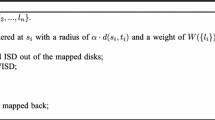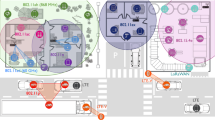Abstract
Balanced fairness is a new resource sharing concept recently introduced by Bonald and Proutière. We extend the use of this notion to wireless multi-hop networks, e.g. ad hoc networks, where the link capacities at the flow level are not fixed but depend on lower layer issues such as scheduling and interference. Utilizing this extension we present the theoretical framework for flow level performance analysis of elastic traffic in the setting, assuming that the wireless bandwidth resources are subject to linear constraints. We discuss how different physical and access layer configurations can be described by the linear constraint model and devise an efficient computational scheme for solving the system. The concepts and the computational scheme are illustrated by a number of examples.
Similar content being viewed by others
References
J. Aein, A multi user, blocked-calls-cleared, demand access model, IEEE Transactions on Communications 26(3) (1978).
E. Arikan, Some complexity results about packet radio networks, IEEE Transactions on Information Theory IT-30 4 (1984) 681–685.
M. Bazaraa, H. Sherali, and C. Shetty, Nonlinear programming; Theory and Algorithms. Wiley, 1993.
T. Bonald and A. Proutière, Insensitivity in processor-sharing networks, Performance Evaluation 49 (2002) 193–209.
T. Bonald and A. Proutière, Insensitive bandwidth sharing in data networks, Queuing Systems 44 (2003) 69–100.
T. Bonald and A. Proutière, On performance bounds for balanced fairness, Performance Evaluation 55 (2004) 25–50.
T. Bonald, A. Proutière, J. Roberts, and J. Virtamo, Computational aspects of balanced fairness, in: Charzinski et al. (Eds.), Providing Quality of Service in Heterogeneous Environments, Elsevier Science, (2003) pp. 801–810.
P. Gupta and P. R. Kumar, The capacity of wireless networks, IEEE Transactions on Information Theory 46(2) (2000) 388–404.
B. Hajec and G. Sasaki, Link scheduling in polynomial time, IEEE Transactions on Information Theory 34(5) (1988) 910–917.
X. Huang and B. Bensaou, On max-min fairness and scheduling in wireless ad hoc networks: Analytical framework and implementation, in: Proc. ACM MobiHOC (2001) pp. 221– 231.
M. Johansson and L. Xiao, Scheduling, routing and power allocation for fairness in wireless networks, in: Proc. IEEE Vehicular Technology Conference (2004).
R. Leelahakriengkrai and R. Agrawal, Scheduling in multimedia CDMA wireless networks, IEEE Transactions on Vehicular Technology 52(1) (2003).
H. Luo, S. Lu, and V. Bharghavan, A new model for packet scheduling in multihop wireless networks, in: Proc. ACM MOBICOM, (2000) pp. 76–86.
L. Massoulié and J. Roberts, Bandwidth sharing: Objectives and algorithms, IEEE/ACM Transactions on Networking 10(3), (2002) 320–328.
J. Mo and J. Walrand, Fair end-to-end window-based congestion control, IEEE/ACM Transactions on Networking 8(5) (2000) 556–567.
R. Nelson and L. Kleinrock, Spatial tdma: A collision-free multihop channel access protocol, IEEE Transactions on Communications 33(9), (1985) 934–944.
A. Penttinen and J. Virtamo, Performance of wireless ad hoc networks under balanced fairness, in: Proceedings of Networking, (2004) pp. 235–246.
O. Somarriba, On constraint power control for spatial tdma in multi-hop ad hoc radio networks, in: Proceedings of the 2nd Swedish Workshop on Wireless Ad-hoc Networks, Stockholm, Johannesbergs Slott (2002).
H. Taha Operations Research, An Introduction (6th ed.). Prentice Hall, 1997.
L. Tassiulas and S. Sarkar, Maxmin fair scheduling in wireless networks, in: Proc. IEEE INFOCOM (2002) pp. 764–772.
V. Timonen, Simulation studies on performance of balanced fairness. Master’s thesis, Helsinki University of Technology. http://www.netlab.hut.fi/tutkimus/fit/publ/thesis_Timonen.pdf(2003).
F. A. Tobagi, Modeling and performance analysis of multihop packet radio networks, in: Proceedings of the IEEE 75(1), (1987) pp. 135–155.
Author information
Authors and Affiliations
Corresponding author
Rights and permissions
About this article
Cite this article
Penttinen, A., Virtamo, J. & Jäntti, R. Performance analysis in multi-hop radio networks with balanced fair resource sharing. Telecommun Syst 31, 315–336 (2006). https://doi.org/10.1007/s11235-006-6721-5
Received:
Accepted:
Published:
Issue Date:
DOI: https://doi.org/10.1007/s11235-006-6721-5




